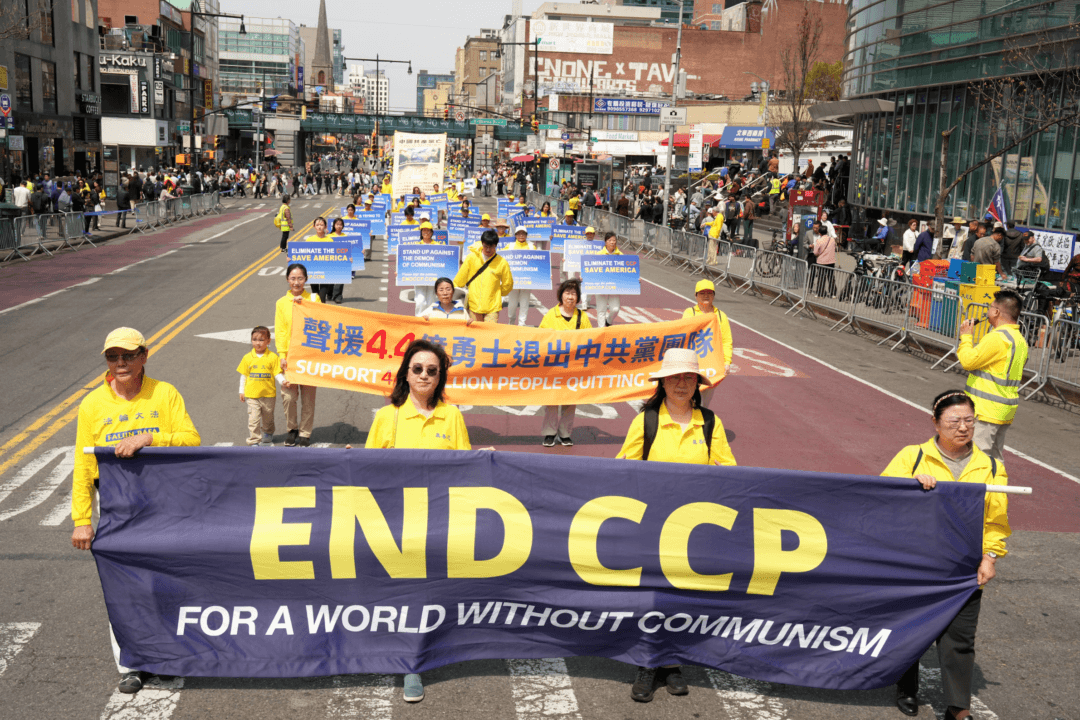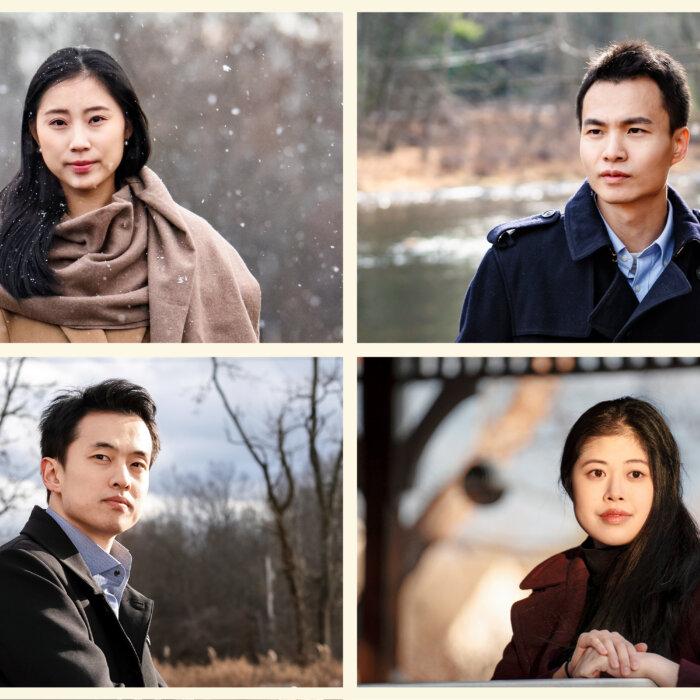NEW YORK CITY—Thousands of Falun Gong practitioners and human rights advocates held a parade and rally in the Flushing neighborhood of New York City on April 19 to commemorate the anniversary of a key event in China and support the 445 million people who have quit the Chinese Communist Party (CCP).
The event in Queens comes ahead of April 25, the date on which 10,000 Falun Gong practitioners turned out to peacefully appeal for freedom of belief near the ruling party’s compound in Beijing 26 years ago.
Falun Gong, also known as Falun Dafa, teaches the principles of truth, compassion, and tolerance, as well as five meditative exercises. It was introduced to the public in the early 1990s and became widely popular through word of mouth, so much so that official state estimates put the number of practitioners in China at about one in every 13 people.
In 2004, The Epoch Times published “Nine Commentaries on the Communist Party” to elucidate the history of the CCP and to help clear up the falsities it has spread, including about Falun Gong. That publication led to a global “Quit the CCP” movement and online portal where Chinese people quit the CCP and its affiliated organizations. More than 445 million people have done so to date.
“This is a sign that the Chinese nation is awakening and that the evil communist forces that have entrenched China are disintegrating. And this process is creating great history,” said Wang Zhiyuan, chair of the Global Service Center for Quitting the CCP, at the April 19 rally in Flushing.
Organizers said more than 3,000 people attended the event and 27 people received certification of officially quitting the CCP.
At the rally, some Falun Gong practitioners who had participated in the historic April 25 appeal shared their stories, and human rights advocates gave speeches.
Rally speakers included Zhang Erping, spokesperson for the Falun Dafa Information Center; Martha Flores-Vazquez, New York State Assembly district leader for Flushing; Jacqui Phillips, entrepreneur and international speaker; Wei Libin, New York director of the China Democracy and Human Rights Alliance; Ren Guoxian, a participant of the April 25 appeal; Zhang Guiying, an eyewitness to the events that led to the appeal; and An Qiang, a Chinese citizen who quit the CCP.
What Happened on April 25?
On a sunny Sunday in April 1999, more than 10,000 Falun Gong practitioners turned out in front of Beijing’s Zhongnanhai compound, where the regime’s senior leadership and State Council are seated.The CCP has referred to the large-scale gathering as a reason for its whole-of-state persecution of Falun Gong. However, eyewitnesses say and documentary evidence shows that the gathering was an orderly and peaceful line of people intending to make an official appeal.
Ren Guoxian, who was born and raised in Beijing, began practicing Falun Gong in 1998. At the time, large groups of Falun Gong practitioners would meditate together in public spaces such as parks and squares across the city, she recounted during the rally.
But in 1999, “the atmosphere suddenly became tense,” Ren said. In March and April, there were reports that Falun Gong practitioners were being harassed, and on April 24, “a vicious incident occurred in Tianjin, a city adjacent to Beijing, where police beat and illegally arrested more than 40 Falun Gong practitioners.”
Ren heard from Falun Gong practitioners she meditated with at a park that the police had told them that the only way to appeal the arrests was to “report the situation to the central government,” and practitioners suggested doing just that.
She said that because she was aware of the Tiananmen Square massacre in 1989, she was hesitant to get involved with the regime, but also had reservations about doing nothing.
“I am also a Falun Gong practitioner,” she said at the rally. “I have benefited both physically and mentally from practicing Falun Dafa. It is as if I have been given a second life and have escaped the desperate situation caused by illness. If I were arrested for no reason, would I also hope that other practitioners would lend a helping hand?”
The next day, Ren and one other Falun Gong practitioner took a bus together to get to the State Council’s Letters and Calls Office. She thought to ask for directions after walking to the approximate street, but when she turned the corner, she saw that many people were there already, and police were directing them to line up on the sidewalk and wrap around Zhongnanhai.
“I was a little puzzled at the time. Is the State Council’s Letters and Calls Office inside Zhongnanhai?” Ren said at the rally.
She later learned that the regime intended to use the situation as a photo-op and falsely claim that the surrounding of the political headquarters was evidence of a potential uprising.
Ren said that word spread at about 8 a.m. that then-Premier Zhu Rongji was sending a few representatives to speak with the Falun Gong practitioners.
“During the process, everyone was very quiet,” Ren said. “Some practitioners standing in the front row were reading [Falun Gong books], while some practitioners in the back row were doing the exercises. The older ones, tired of standing, sat on the ground to rest for a while.
“Although the number of petitioners exceeded 10,000 and lasted a whole day, from beginning to end, no one shouted slogans, no one held up banners, no one gave speeches, no one distributed leaflets, no one made loud noises, and there was no extreme behavior.”
At about 9 p.m., Ren went to a nearby store to call home and check in, and by the time she returned, she saw that the practitioners were dispersing, as police said the Falun Gong practitioners arrested in Tianjin would be released and the state would respond to other issues after further discussion.
“Tens of thousands of Falun Gong practitioners dispersed in a very orderly manner,” Ren said. “I was shocked by the speed, quiet order, and cleanliness of the scene. I found it incredible. How come so many people dispersed in such a short time? Even the cigarette butts thrown on the ground by the police were picked up, and there was not a single piece of paper left on the ground.”
April 24, 1999
Speaking at the rally, Zhang Guiying, a doctor, said she was at Tianjin Normal University at the time. She was an eyewitness to the events leading up to the arrest of dozens of Falun Gong practitioners in the early hours of April 24, 1999.After a libelous article about Falun Gong appeared in the Tianjin Normal University journal from April 21 to April 23, Falun Gong practitioners at the university went to meet with the journal’s editorial department on the afternoon of April 23. Zhang went to lend support.
“There were no slogans or signs, and no loud noises. They just waited quietly for the editorial department to meet them,” Zhang said. “At around 6 p.m., the Education College administration started shouting through a loudspeaker, demanding that we leave, otherwise we would bear the consequences.”
A CCP official was at the university, and after the official left by car, Zhang said, a large group of riot police came at the practitioners.
“No matter whether they were young or old, women or children, the police beat and kicked them,” Zhang said. “At that time, an old lady in her 60s with gray hair was pushed and beaten fiercely by the police. After a while, the old lady fainted. Four policemen lifted another old lady out, two by her feet and two by her arms. ... Her bare back was dragged on the ground, and she was dragged all the way from the school to outside the gate and thrown out.”
By midnight, students had turned out in large numbers, linking arms at the university gates and “forming a human wall” before the police officers, Zhang said. The confrontation lasted until the early hours of April 24.
Falun Gong practitioners live by the principles of truth, compassion, and tolerance, Zhang said, and so when faced with such violence, they peacefully told the police why they were there and tried to persuade them to do good. But the violent clampdown continued, Zhang said. She recalled a young man intervening after a young woman was harshly beaten; police smashed his face into a wall. Contrary to these events, Chinese state media reported that no one was beaten or arrested.
Quitting the CCP
An Qiang came to the United States in July 2023 as a refugee. He had quit the CCP and at the rally said he wanted to share why.“As early as when I was a student, I was brainwashed by the Communist Party and educated that there would be no new China without the Communist Party, and we are the successors of communism,” An said.
While he was in elementary school, he crossed paths with a Falun Gong practitioner, an older woman who he said put a small CD in his hand on the way home from school.
“It had the [characters for] ‘Freegate’ written on it,” he said.
It turned out to be software that allowed the user to bypass the CCP’s internet censorship wall. As a result, An eventually learned about the CCP’s bloody history, including the Great Famine and other major events in which the regime caused tens of millions of deaths and then swept it under the rug or blamed natural disasters, he said.
An said that not only were the Chinese people beaten down by the CCP physically, but also their thoughts were “distorted” by the regime, including by inciting hatred against other nations such as the United States and Japan after those countries provided various forms of aid.
“Under the rule of the CCP, kind people in society have become the objects of oppression, while evil people are at ease,” he said.
He also said that he recently learned from a family member that he had a sister who had to be given away because of the CCP’s family planning policy at the time.
“Now I can’t find her. ... The CCP has destroyed our family,” An said.
“There was also a period of lockdown during the epidemic when I was locked in and almost starved to death. I came to the United States to seek asylum, and [CCP agents] went to my home to threaten my father and family.”
Wang encouraged all Chinese people who are members of the CCP and its affiliated groups to withdraw from these organizations. Wang is also the president of the U.S.-based nonprofit World Organization to Investigate the Persecution of Falun Gong. The group has published more than 600 reports detailing the CCP’s human rights crimes.
He said the April 25 appeal was emblematic of how Falun Gong practitioners have responded in the face of persecution since then.
“Throughout history, when faced with oppression from powerful tyranny, human beings have either risen up and used force to end tyranny,” he said, “or endured it in silence and allowed it to destroy and ravage [them].
“Facing the CCP’s brutal persecution, Falun Dafa practitioners have neither resisted violently nor endured it in silence. Instead, [they aim] to clarify the truth, expose the evil, and save all living beings from danger.”







